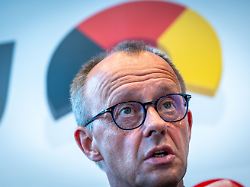Rule six countries together
Greens irritated by Merz’s “main opponent” criticism
06/28/2023, 08:25 am
After the AfD in Sonneberg won a district administrator’s post for the first time, Merz announced a tougher approach to the Greens. But they can’t really understand it. Both parties sit in six state governments. The CDU leader also calls for a new refugee policy.
The Greens reacted with irritation to the declaration of war by CDU leader Friedrich Merz and reminded them that there are black-green coalitions in several federal states. “Not a day after the AfD has won a district election, we call out other democratic parties as ‘main opponents’, with whom we coalition in several federal states,” said the political director of the party, Emily Büning, the “Rheinische Post”.
In the Thuringian district of Sonneberg, an AfD candidate was elected district administrator for the first time in Germany on Sunday. Merz then announced an even stronger conflict with the Greens – these would be “the main opponents” in the federal government for the foreseeable future. The CDU chairman and Union faction leader justified this by saying that the Greens are responsible for the current polarization in energy and environmental policy.
Büning replied that the Greens prefer to rely on constructive politics. “Instead, we are concentrating on the problems of the people in this country. When it comes to the question of how best to solve these problems, we are happy to enter the democratic competition for the best ideas.” The CDU reacts in North Rhine-Westphalia, Hesse and Schleswig-Holstein with the Greens as junior partner, in Baden-Württemberg the Union is the smaller coalition partner in a green-black alliance. In Brandenburg and Saxony, the two parties also govern together – each in three-party coalitions with the SPD.
Merz also relies on other refugee policies
According to Merz, a different refugee policy could also ensure that the AfD could lose approval. “All election researchers tell us that the AfD almost only has this one topic,” Merz told the “Augsburger Allgemeine”. “A different refugee policy would lead to the AfD’s poll numbers falling again.” But if the federal government does the opposite, “then the opposition cannot halve it.”
In the interview, Merz was asked about a statement from 2018: As an applicant for the CDU presidency, he said at the time that he believed he could halve the AfD values. He now emphasized that the context was different at the time. “When I said that, we were still in the government and it was up to us to make decisions that would have kept the AfD small. That applies above all to refugee policy.”
Merz, however, renewed the Union’s criticism of a reform of the Residence Act decided by the traffic light groups. In the future, there will only be talk of “control” and no longer of “limitation” of immigration. “The necessary controlled immigration into the labor market will continue to be overtaken by uncontrolled immigration into our social systems,” warned the CDU chairman and Union faction leader. You have to control immigration and limit it, “there’s no other way.”
The traffic light had argued that the change reflects that “immigration law that is geared both to Germany’s overall economic interests and to humanity is an important concern and goal of the governing coalition”. Merz sees the compromise of the EU interior ministers on a reform of the European asylum rules positively – but he warned that one is far from “that that will become applicable law”. “That won’t be the case until 2024 at the earliest, possibly even as late as 2025, and by then the Greens in Germany and Europe in particular will be massively opposed to this compromise.”
